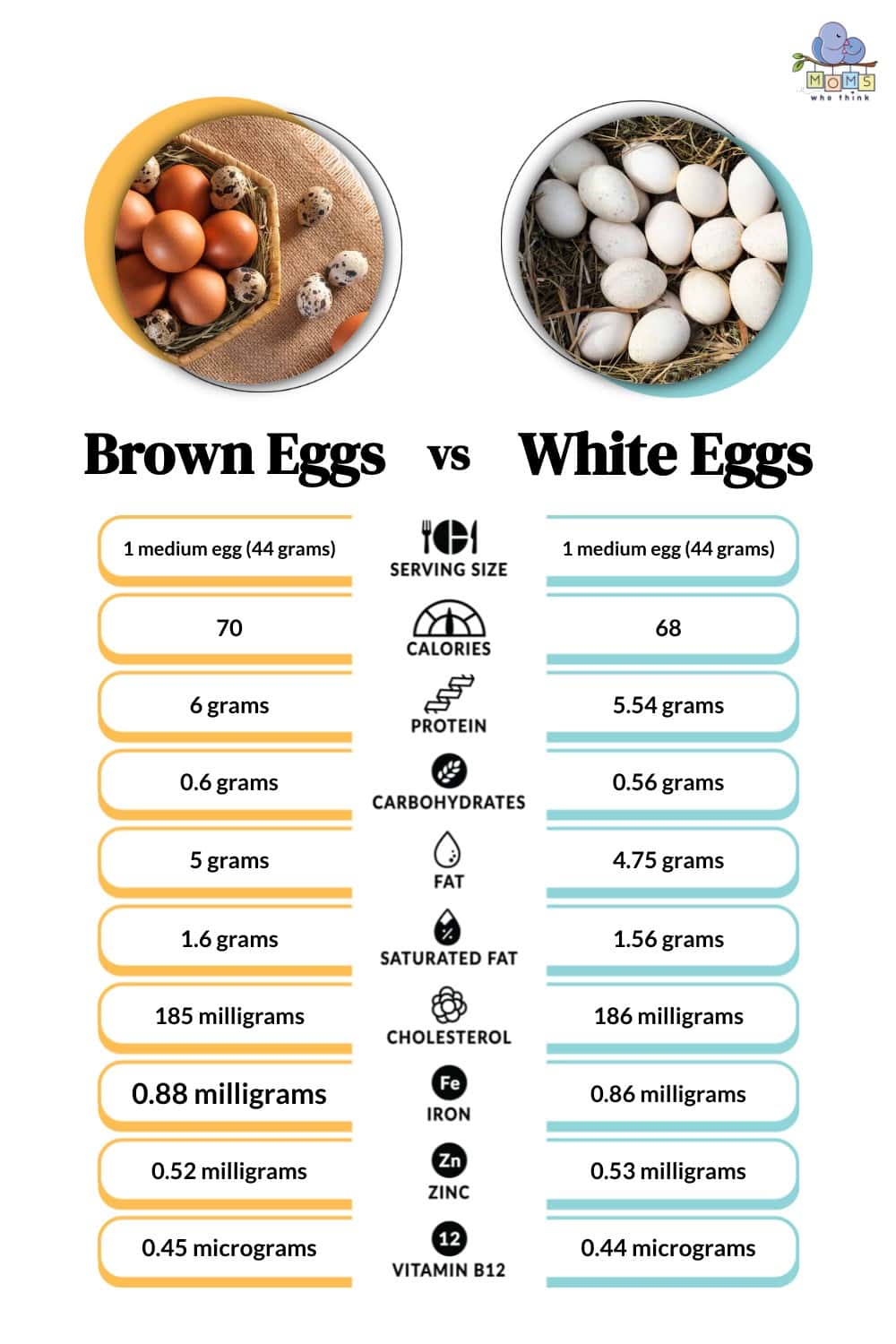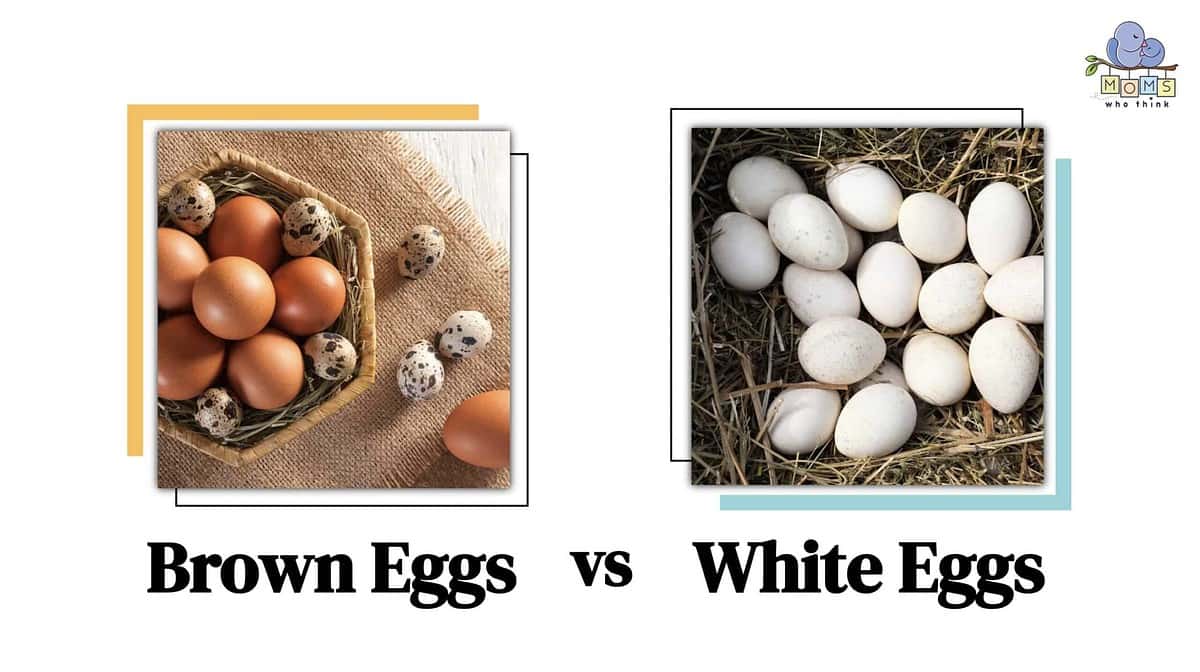Have you ever found yourself standing in the grocery store comparing eggs to eggs? Hens with white feathers lay white shell eggs, while brown eggs come from hens with brown feathers. What sets them apart when it comes to taste and texture? This post will explore everything you need to know about the differences between brown vs. white eggs, including the nutritional benefits and how to select healthy eggs.
Brown vs. White Eggs: The Nutritional Difference
Although brown and white eggs may appear different based on their color, there's more than the shell color that differentiates them. According to the USDA, “The breed of the hen determines the color of her eggs. Chickens such as the Leghorn, White Rock and Cornish, lay white eggs. Rhode Island Red, New Hampshire, and Plymouth Rock lay brown eggs”. However, regarding nutrition, there isn't a significant difference between brown and white eggs. The color of the eggshell doesn't impact nutrients, like protein or vitamins found inside. Ultimately, deciding which color eggs to buy mostly depends on preference and maybe even the type of chicken that lays them.
Brown vs. White Eggs: Factors Influencing Nutritional Value
When faced with the decision between the two eggs, there are more factors to consider beyond just the shell's color. The hen's age, how the eggs are produced, and what the hen is fed can all impact the nutritional value of their eggs. For instance, older hens tend to lay eggs that might have fewer nutrients. Furthermore, if hens are given a diet that includes omega-3 fatty acids, they produce eggs with higher levels of this brain and heart-healthy nutrient. Lastly, other essential vitamins and minerals like vitamin D, iron, and selenium also vary depending on the diet the hens consume.
In general, free-range hens with the freedom to roam and enjoy a diverse diet produce more nutritious eggs than those confined in cages. Overall, while there are insignificant differences in nutrition based on the shell color between both eggs, it's worth considering these factors when choosing which type to buy from the store.

Brown vs. White Eggs: Selecting Healthy Eggs
Shell color shouldn't be your primary concern when looking for high-quality eggs that provide nutrients for a balanced diet. Although some individuals believe that brown eggs are healthier, this idea is nothing more than a myth. The truth is both types of eggs offer similar levels of nutrition and deliciousness! Instead, the key to selecting top-quality eggs is identifying qualities that signify freshness and nutrient density. Use the tips below to help you with this.
- Examine an egg's quality by holding it to the light and checking it for cracks or visible deformities.
- Be aware of the carton's expiration date and choose eggs within their sell-by date.
- Consider purchasing eggs from chickens that roam freely or are raised in pastures, as these chickens have been shown to produce eggs with higher levels of nutrients such as omega-3 fatty acids and vitamin D.
With these suggestions, you can confidently choose eggs that provide the best health benefits and tasty flavor regardless of shell color!
Brown vs. White Eggs: Tips on Storing Eggs
Now that we know there isn't any significant nutritional difference between them, what truly matters is how you store your eggs. Appropriate storage techniques can extend their freshness while preserving their taste and nutritional value. It's always a good idea to store eggs in their cartons to allow you to check the sell-by date when needed. It is also best to keep them in the coldest part of the refrigerator. Storing eggs in the fridge helps protect them from bacteria and prevents moisture loss. Avoid keeping eggs on the fridge door since the temperature fluctuates whenever you open it. By following these tips, you can ensure that your brown or white eggs stay fresh and tasty for longer, providing you with satisfying flavor and nutritional benefits.

Eggs are a main ingredient in many popular dishes.
©Lucy.C/Shutterstock.com
Brown vs. White Eggs: Common Uses
Eggs are needed in many recipes. Whether you prefer white or brown, both are equally nutritious and delicious. Below are some ways to incorporate eggs into your cooking.
Baking
Eggs play a role in baking as they add richness and moisture to cakes, muffins, cookies, and other baked goods. While brown eggs are often preferred for baking, white eggs work just as well and can be a more budget-friendly option.
Breakfast Foods
- Scrambled Eggs
Scrambled eggs are a popular breakfast choice that can be prepared using brown or white eggs. Both eggs have a similar taste and texture in this state. However, if you have never had it before, it might be worth trying to prepare scrambled brown eggs.
- Omelets
Omelets are an excellent choice for breakfast or brunch. Whether you prefer a traditional or fancy omelet, white and brown eggs are excellent choices. One of the best aspects of preparing omelets is the freedom to customize them with ingredients already available in your kitchen, such as vegetables, cheese, or even leftover meats.
Appetizers
- Deviled Eggs
Deviled eggs are an appetizer that can be personalized to suit any occasion. The color of the eggshell does not affect the outcome when making deviled eggs. However, add food coloring to the egg mixture to impress your guests with a vibrant appetizer presentation.
- Egg Salad
Egg salad is widely enjoyed at potlucks and picnics. Enjoy it on its own, or use it as a sandwich filling. When preparing egg salad, the color of the eggshell does not impact its taste. As a tip, consider adding Dijon mustard and fresh herbs to enhance the flavor of your egg salad.

©
Ultimately, the color of an eggshell has little impact on its nutritional content. What truly matters is the hen's diet, living conditions, and how the egg is prepared. While some believe brown eggs may have a better taste and texture, there is no significant difference in their health benefits compared to white eggs. Therefore, feel free to choose either egg color and focus more on factors like defect-free appearance, proper storage, and the expiration date to ensure your egg is nutritious.
Both brown and white eggs can be used interchangeably in cooking and baking. Even if you prefer one color over the other, don't hesitate to experiment with both in your recipes. They are highly nutritious and add a unique touch to your meals. The next time you go grocery shopping for eggs, feel free to pick up a carton of brown, white, or both.
Up Next
- How To Introduce Eggs To Baby Safely In 3 Steps
- The Secret Steps to Easy-to-Peel Hard-Boiled Eggs
- Deviled Eggs Recipe
- Egg Whites vs. Eggs: What Are the Health Differences?
- How to Cook Hard Boiled Eggs Perfectly, 3 Unique Ways to Follow for Excellence
The image featured at the top of this post is ©iva/Shutterstock.com

